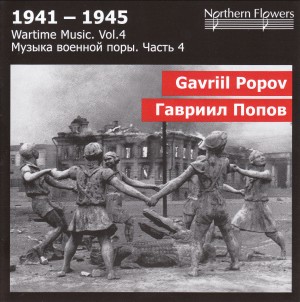|
|
World music CD DVD shop and Classic distribution
|
|
|
|
| POPOV, Gavriil Nikolayevich (1904-1972) | | | Symphony No. 3"Heroic" Symphonic aria for cello and string orchestra. (1939-1946) | | | 1. | Intrada. Andante maestoso e molto espressivo | 7:08 | | | 2. | Allegro con fuoco, quasi presto | 11:48 | | | 3. | Prestissimo | 6:23 | | | 4. | Largo espressivo, molto cantabile e sempre con moto | 20:27 | | | 5. | Presto impetuoso | 8:24 | | | Symphonic aria for cello and string orchestra, Op. 43 (1945) | | | 6. | Largo | 15:32 | | Mindesten drei Dutzend Kriegs-Symphonien entstanden in dieser Zeit - und wahrscheinlich noch viel mehr danach. Ihr ästhetisch-ideologisches Fundament wurde aber schon vor 1941 gelegt, nämlich 1935, als die Machthaber zum Sturmangriff auf den sowjetischen Avantgardismus bliesen. Wissarion Schebalin erntete mit seiner 4. Symphonie heftige Kritik, obwohl das Werk einen roten Mythos aus dem Bürgerkrieg verherrlicht. Das erste offiziell verbotene Stück war Gawriil Popows 1. Symphonie. Schostakowitsch zog daraufhin seine von Popow beeinflusste 4. Symphonie noch vor der Uraufführung zurück. Trotzdem wurde er 1936 zur Zielscheibe des berüchtigten Prawda-Artikels «Chaos statt Musik» - die Große Säuberung begann.
Sie endete erst im Großen Vaterländischen Krieg. Er brachte neues, furchtbares Elend, aber er brachte den Künstlern auch eine neue Freiheit. Die Kommissare hatten sich um anderes zu kümmern als um «formalistische» Tendenzen in der Musik. Trotzdem kehrten die verteufelten Neutöner Mossolow, Popow und Schostakowitsch nicht zu ihrem Vorkriegs-Avantgardismus zurück - sie schrieben jetzt, ohne dass es einer höheren Weisung bedurft hätte, patriotische Symphonien. Doch waren damit die Konflikte zwischen Komponisten und Funktionären nur vorübergehend befriedet. Sie brachen sofort nach Kriegsende wieder aus.
Volker Tarnow www.kultiversum.de
Popov had long been a composer whose music I wished to hear as he was highly esteemed by Shostakovich and other important Soviet composers. Based on the two works on this disk I would say his music possesses a lot of interest and occasional profundity, but that he cannot be grouped with Shostakovich, Prokofiev, and Miaskovsky, although Stalin would have disagreed with me.
The Heroic Symphony is based on string interludes from a 1939 film about the Spanish Civil War. Popov became bogged down in 1940 in his efforts to produce the symphony and only got back to work in 1944, perhaps inspired by the new war that was going on in his own country. The Symphony is in five movements with the opening Intrada presenting a motto theme for the struggle in Spain as well as two main themes. The manipulation of the strings throughout is extremely impressive. The allegro second movement is notable for its central elegy-reminiscent of Shostakovich. The third movement is based on three Spanish dances and may remind some of early Britten. The big movement is the largo, which reaches moments of real eloquence and is quite moving. The end is especially effective. The last movement is even better, utilizing the two themes from the first movement and eventually ending with motto theme. There is some very strong music here.
Popov interrupted his work on the “Heroic” Symphony to write the Aria for cello and Strings in memory of his friend the author A.N. Tolstoy. It is a three-part work which proceeds to increase in sadness as it moves from prologue to central meditation to coda. The last provides a few moments of relief from the sadness, but is hardly affirmative. In its depth of feeling and intensity of emotion I found this work far more satisfying than the Symphony.
Dmitri Khrychov supplies both able handling of the solo instrument and intensity of feeling, the two things most melded for his piece. Alexander Titov has excellent control of the strings and maintains the necessary momentum throughout the piece. There are so many sounds one can get from strings and they all seem to be here. There are moments when he could show more liveliness, but that may partially be the music itself. The strings themselves perform with great vigor and ability and the sound is quite clear. While not totally impressed by the music I can say that I will look for more Popov.
William Kreindler
www.musicweb-international.com
|
|


